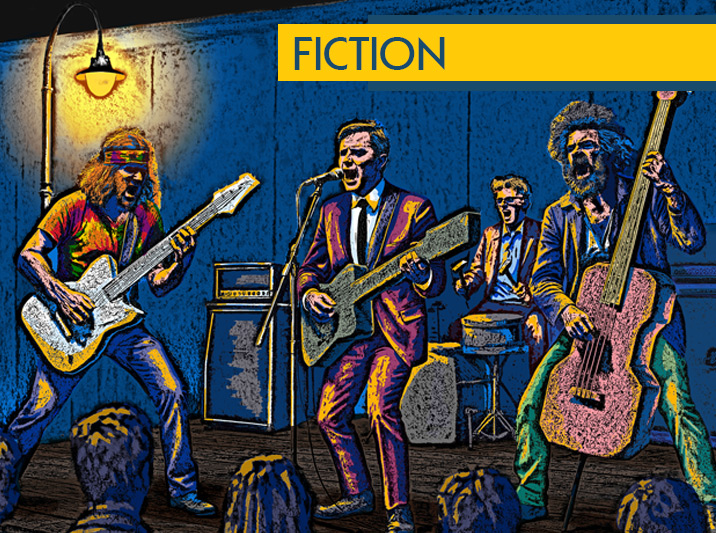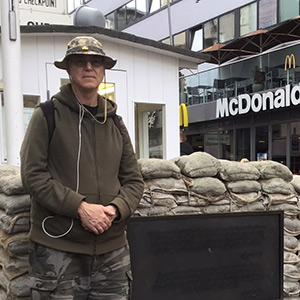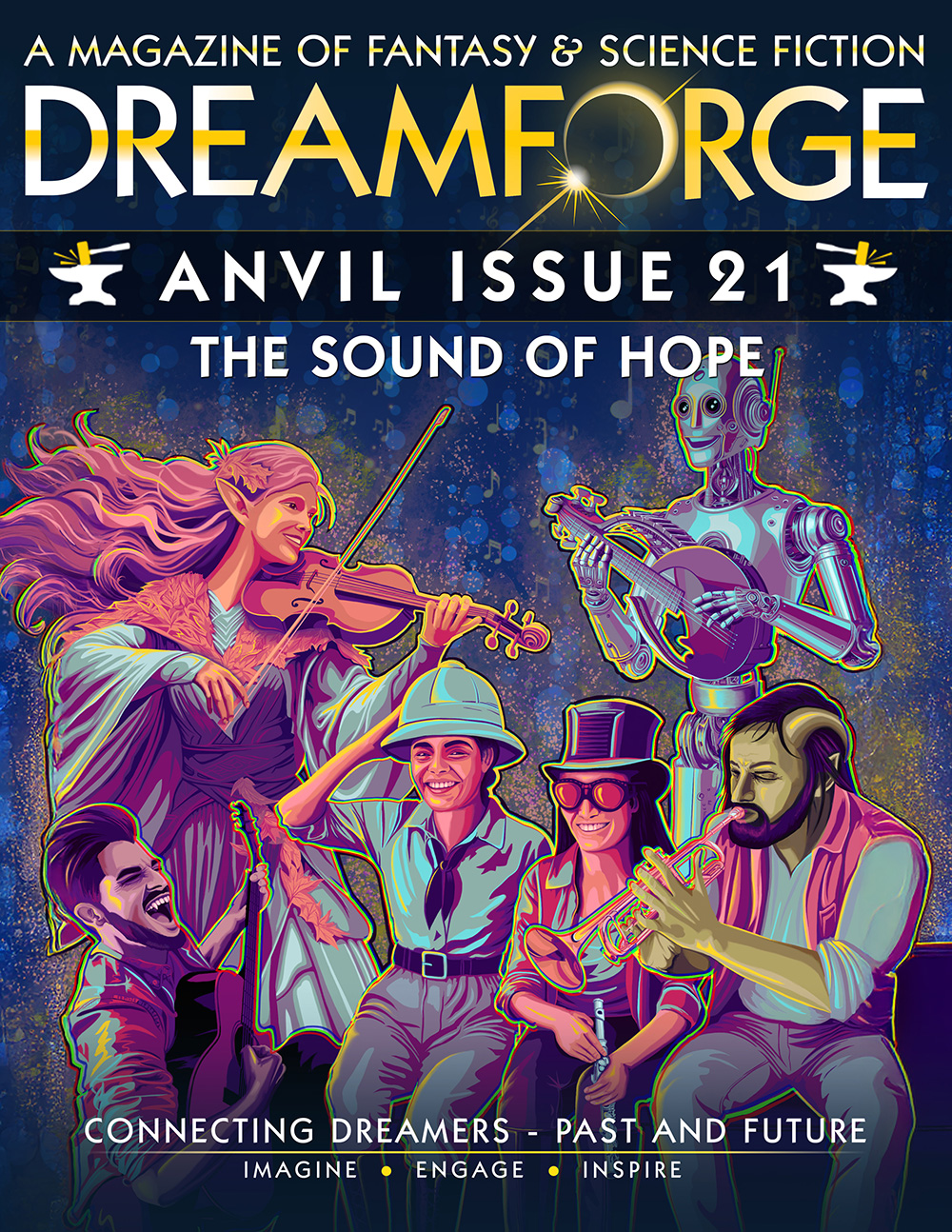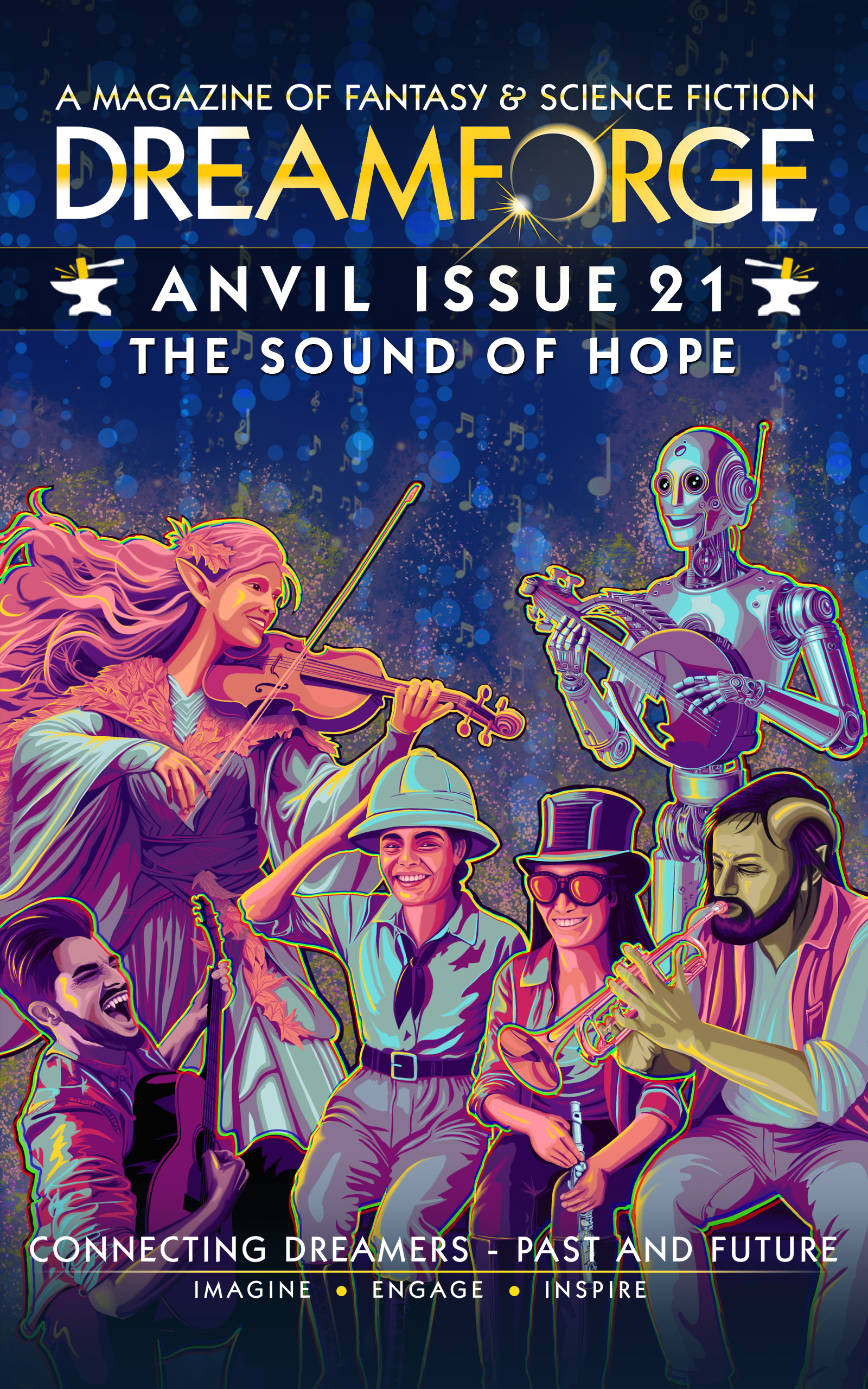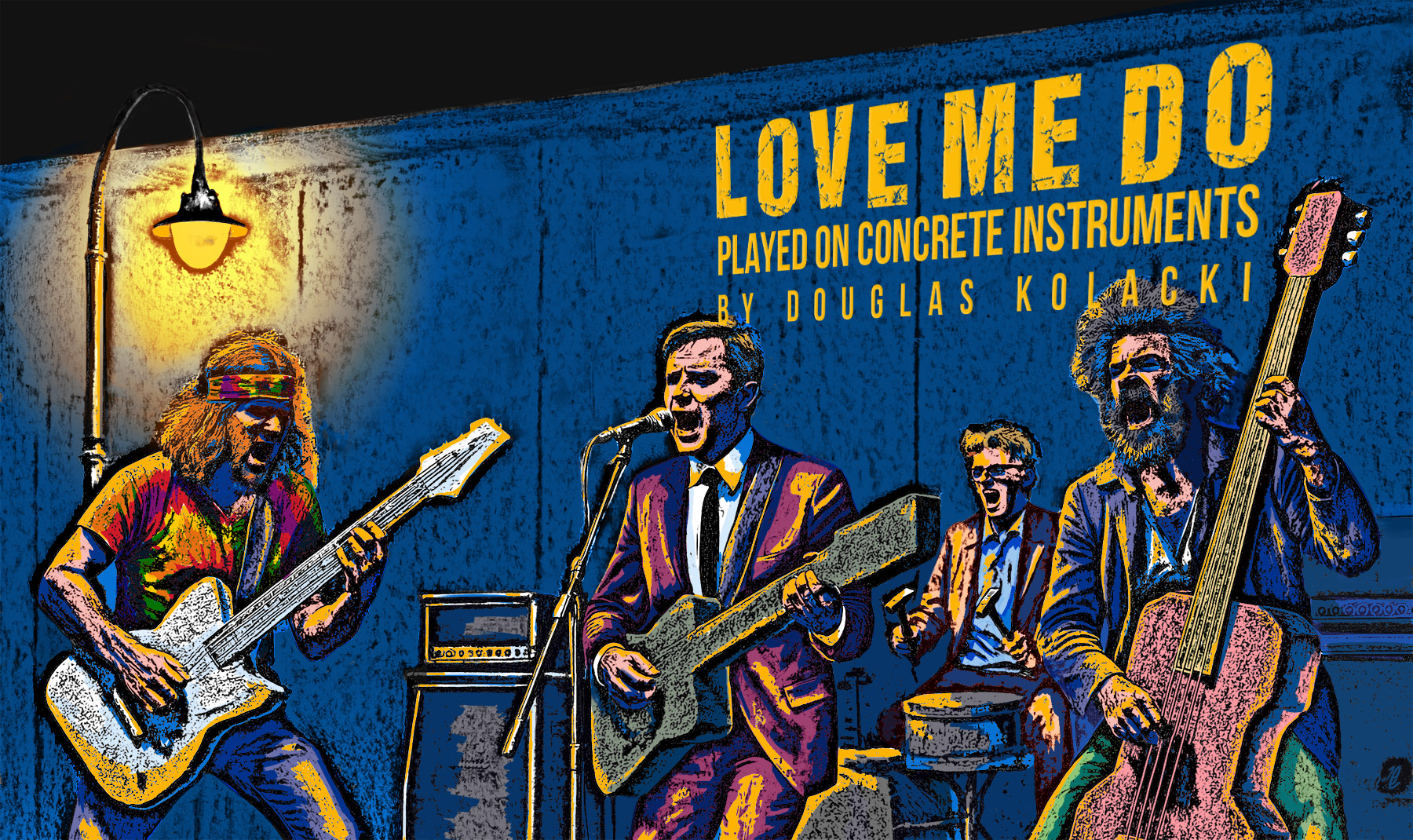 September 1975
September 1975
The noise of the concert…
It still rang in Gerd’s mind the next day. Unauthorized. Unsanctioned. No way it could have been sanctioned, those concrete-slab guitars that must have weighed a ton, leather straps straining, the sweating men pounding the strings with their fists and assaulting the East Berlin air with their glorious din— a continual cacophony that never slowed, never wavered. Only the lyrics changed, wailed by Guitarist One through the wall of sound he and his band raised to rival the barrier behind them and the death strip beyond.
He’d squinted at those instruments. Concrete? But this concrete was alive, loud, untamable. No, the state would never have approved it. Those crazy fools played too close to the border, what the West called The Wall and the DDR called the Anti-Fascist Protective Rampart. Gerd stayed nonetheless, taking his chances and jostled by the crowd, some of them cheering, others hanging back. A few people hurried up, snuck a look at the band and just as quickly retreated. A searchlight roved about from a watchtower two blocks down, seeking the source of all the racket—
“Herr Holstein?”
He snapped out of his reverie. The uniformed woman was watching him from behind her desk, armed with her own instruments: typewriter, rotary-dial phone, and the endless files on endless citizens that must have been packed into those filing cabinets.
“You sent for me, Comrade Schlagel?” He stood by the door, having been ushered in past everyone else waiting outside.
She motioned for him to sit. Her gray uniform was perfectly pressed; her graying black hair locked into a tight bun. He sank into the chair opposite her, keeping his face level. Someone saw me, he thought. Or did they even suspect him of playing? He had given up his guitar, along with his three-piece band, more than a year ago.
Or maybe this was about Maria. Six months had passed since she kissed him goodbye and flew back to Naples. A long time…but the Ministry for State Security never forgot. Their whole reputation depended on discovering all, knowing all, and never forgetting.
What Schlagel said next, however, surprised him. “There is now graffiti on our side.”
He had been all set to say No, comrade, it wasn’t me, my guitar was a normal 1959 Stratocaster and I don’t even have it any more. Tobacco sunburst, three single-coils, its tremolo arm lost before he sold it to a spiky-haired punk rocker in black leather.
“On the western side,” she continued, “graffiti covers the entire span.” She scribbled on a form as she spoke, looking down at it. She pulled open a drawer, slid the form inside, closed it and returned her attention to Gerd. “Everyone paints, or spray-paints, whatever they like. They would not find that so easy over here. But this morning we found two such markings, both at Potsdamer Platz and twenty meters apart.”
She drew two large photographs from her desk and set them in front of him, one at a time. He bent to examine them.
The pictures showed black words printed in capitals on the bare concrete. The back wall, four meters high and topped with a round pipe, was painted white, the better to see any intruder. The neighboring area, along with its buildings, was a buffer zone off limits to most citizens. Gerd had expected to see hastily dashed-off slogans or quick slashes of spray paint, but these markings were professionally done and had obviously taken some time.
“Both were painted on canvases beforehand,” Schlagel said, “and pressed to the wall. With a very solid glue— the workmen are still trying to scrape the signs off. It is not like any adhesive we know.”
Gerd stifled an urge to harrumph. Nothing in the Deutsch Democratic Republic matched the West, everyone knew that well enough. “Both say the same thing,” he said. “‘Mister…'”
He stopped— perhaps best not recite it out loud. Not that it would get him into trouble, of course. It was no crime to read something off a sign! He chided himself. What, were they going to clap him in irons just for—
She read it for him. “‘Mister Gorbachev, tear down this wall!'”
There was one difference. On the other sign, someone had drawn a line through the Russian name and scrawled HONECKER above it.
Gerd looked up. “Who’s Gorbachev?”
“The only one we could find is First Secretary of the Stavropol Kraikom— southwestern Russia. He was awarded the Order of the October Revolution three years ago, but no one can fathom why anyone would ask him to remove the rampart.”
She leaned forward, clasping her hands. “Last night, musicians played several songs in that same area. Their instruments seemed designed to resemble the rampart— a protest, perhaps? And another curious thing. Right beside the graffiti, pieces of the rampart had been chipped off.”
She paused. “Really,” he finally said.
“Were you there?”
She already knew the answer. Between secret policemen and informers, the Stasi had an operative for every six or seven citizens, and the performance had been attended by a good many more than that.
“Yes. I was.” Spoken as matter-of-factly as he could.
“Up close to the musicians? You made eye contact?”
A chill gripped his insides. “Yes.”
“Herr Holstein.” Her eyes locked onto his. They were hazel— he had not really noticed that before. “We would like to offer you an opportunity.”
A moment passed. She seemed to be waiting, so he said: “You want me to spy? Ah…why would I do that?”
Without taking her eyes from his, Schlagel reached back into her desk.
Four hours later, Gerd sleepwalked off the tram. He saw but did not really notice the people swarming around him as his feet steered toward Invalidenstrasse. That was the location Guitarist One had announced as their second, “encore” performance, within a stone’s throw of the Invalidenstrasse border crossing (“that’s right, citizens, we want everyone to know. So all you Stasi flunkies, feel free to run back and squeal to your handlers! Give them our regards.”)
And Gerd Holstein had come. He had not planned to, but here he was. His stunned brain replayed the afternoon and what he had somehow agreed to. He felt as if he had entered Comrade Schlagel’s office as one kind of man and left as another.
Pay attention! There was the crossing down the street, the ever-present soldiers with their ever-present guns. He took care to move like a spy, in what he imagined to be the Stasi way — yes, welcome to the Stasi!— crouched, hands in pockets, looking over his shoulder. Who was he fooling? So instead, he tried to walk as he had seen visitors from the West walk, twenty-four-hour visas in their pockets, like they owned the street.
Get used to the idea, he thought. You’re an informer now.
He had only to follow the crowd. A very large crowd of— how many? He would have to know this —he was sure he’d have to know a lot of things— when he reported back. Two hundred fifty, three hundred. He projected a forced confidence. Don’t attract attention, don’t make eye contact. Got to get up front…
As carefully as he could, he wriggled past onlookers standing and talking among themselves, bumped someone’s shoulder, apologized, accidentally elbowed another, until he stood before the same wooden platform —fifteen meters wide, half a meter off the ground, he noted— that the band had used at Potsdamer Platz.
The speaker cabinets, stacked two high with four speakers to each cabinet, were crowned by what he guessed to be hundred-watt tops. Some bore the white scripted Marshall logo, others Vox, and a Fender amp topped one stack. The cabinets stood among tangles of wire. Then there were the drums, crudely cut from concrete like the guitars. The bass drum was more square than round, marked up with red and blue markings and squiggles. So was the snare drum, though it did sit atop a normal metal stand. The high-hat was normal, the three cymbals normal, the two tom-toms fixed by some means atop the “bass drum,” but the floor tom was a concrete block. It had no stand, but sat on the platform only a few centimeters high, so that the drummer would have to reach way down if he wanted to actually strike it.
Three microphone stands stood poised along the front of the platform, and a conspicuously western generator dominated the space behind it. It chugged like a car straining to beat its top speed, and Gerd could smell its fumes. He could imagine the state confiscating that fine generator and putting it to better use.
How on earth, he thought, could they bring this all here and take their time setting it up? Why weren’t they asked for a permit? Chased away, or arrested? Anything?
But the state was curious. Last night, no one actually saw the band set everything up. Every informer must have shaken their heads; no, they had seen nothing. Somehow it was all just…there.
So, how? The informers had been sent back to watch for the magic trick, to see it in action. Time enough afterward for arrest and interrogation, if it came to that— except that Gerd, apparently, had arrived too late. The gear seemed to mock him: Yeah, how do you like that, ya lousy pinko sellout?
The players bounded up onto the platform, guitar sculptures slung across their chests. Gerd jolted— where did they come from?
Cautious cheers went up from the crowd, and Gerd waved. Guitarist One, a hippie to the core with a tie-dyed headband, stepped up to his microphone, his white slab with ragged edges dominating his front.
The bass player wore a red slab. It outdid the others in size, as if unable to decide whether to be an electric or traditional double bass. His head was swallowed up by hair and beard, white and wild like the Old Testament prophets spoken of by Gerd’s grandmother. The drummer took his place among his own chiseled shards of concrete, brandishing hammers instead of wooden sticks, and Guitarist Two, clean-cut and even wearing a necktie, reached up to twist the knob on his amplifier —7, 8, 9, 10— Gerd, squinting, could swear it went up to 11.
Guitarist One stepped to his microphone and favored the gathering with a grin so confident, so carefree, that he could not have understood where he was, and what he was dealing with.
Watch out.
“Watch out!” the guitarist announced with a shout. The sound system squealed with feedback. “Danger, all you chicks and cats! Tonight, the DDR is under invasion by rock. And. Roll!”
The drummer behind him clinked hammers together along with that last word. The band launched into—
Gerd grimaced. A blast of amplified dissonance shook every speaker, the drummer holding it all together with the classic fast backbeat. The guitarists whanged out chords, the prophet-bassist assaulted the vibrating strings on his hunk of stone.
Guitarist One leaped back to his microphone, wailing words Gerd recognized “The Night Before” by the Beatles. Or a gamely attempt at it, by men who knew how to play their instruments but…well, guitars were not normally made of concrete for a reason.
As for the audience, they stood politely, most of them watching but unmoving, avoiding any attention. One couple toward the back, however, danced up a flurry. Presumably they were not informers.
“Love Me Do” followed next, a little slower with Guitarist Two providing the harmonica —these guys must have liked the Beatles— and then a nod to the current decade with David Bowie’s “Suffragette City.” Between the onslaught of sound that was each song, the singer called out “Are you with us out there?” or “Is everyone having a good time?” A few cheers rose up in response.
Gerd scowled and recalled the afternoon. He was surprised Schlagel hadn’t jumped up and cheered, starchy uniform and all, when he finally…
Why would I spy? he had asked. And she had drawn, from her desk, about a dozen papers. The papers had handwriting on them —he stiffened— his writing. They were letters he had sent Maria, and she had sent him.
He should have guessed. Some of her mail over the months arrived torn and taped back together, with stickers saying DAMAGED IN TRANSIT.
Schlagel set the papers on her desk. “I would like to ask you some questions about these.”
For the next hour she unhurriedly perused paper after paper, read the contents aloud, and asked about them.
“What does it mean,” she asked, “when she says Voglio il mio sole?”
“Oh. Well, you see, that’s the Italian word for sunshine…”
“Why that word?”
“It was her pet name for me. When she was here, we would… You see, my apartment window faces east, and…”
“Your living room window? Your kitchen window?”
“Uh—well…”
“Which window, Herr Holstein?”
“It was my…bedroom window.”
“And so you would watch the sunrise, through that window, on how many mornings?”
“Oh, I don’t know. Now and then.” What did this have to do with anything?
“Twice? Five? Ten?”
“I don’t know, I wasn’t keeping track.”
She leaned back in her chair, the letter face up on the desk before her, the other letters stacked neatly beside it awaiting their turn.
Gerd was about to throw out some random number just to satisfy this woman, when she broke the silence.
“Herr Holstein, did she tell you about her role with her computer firm?”
Why was Schlagel asking this? She must have known already. She probably knew both their great-grandmothers’ maiden names, their favorite colors, the name of Gerd’s stuffed animal when he was two. She probably knew which of his teeth had fillings, the names of all his schoolteachers and his grades in every subject. She probably knew every detail of his life he himself had forgotten. And who did she think Maria was? The head of Italy’s secret anti-DDR sabotage force, taking orders from the CIA?
“She…she was a sales representative, selling components. More a professional person than I am. But comrade? We broke it off after she returned to Naples. We just sort of lost interest; it was really just a fling. It burned itself out. We haven’t written each other in months.”
Something else, however. Once or twice, the two joked about Gerd joining Maria in Naples and getting married up on the rim of Mount Vesuvius. All in jest. But now the thought sent his mind into overdrive— did someone overhear them in a cafe, laughing about it? Did he ever mention it in a letter? Did she?
Schlagel pursed her lips. She gave him a long look. “There is also the matter of you not having worked in some time.”
“Yes!” Gratefully he seized upon the new subject. “Some time after she left, the nightclub where I worked let me go —business was off, they said. Since then I’ve been unemployed—”
Ouch. Wrong word. Schlagel jerked upright: “There is no unemployment in the DDR, Herr Holstein. You are seeking work. You are not unemployed.”
“I’ve applied at clubs, hotels and restaurants. They seemed to like me at the interviews. One manager sent me for a routine medical, shook my hand and said he looked forward to seeing me soon. Then I got a letter saying they regretted to inform me the position had been filled. Other times I didn’t hear back at all.”
How could he get it through to this lady? Maria was harmless. She wasn’t the enemy, and she hadn’t contaminated him! Sheesh!
Schlagel watched him across her desk. “As I said, Mr. Holstein…you have not worked in some time.”
She tapped a pen to her desktop, tap tap tap, tap tap tap. “I am prepared to do this for you. The matter of your friend…after our talk and your answers, plus your added cooperation…we could get you back on at your old nightclub.”
She ceased the tapping, pen poised. “Would that interest you?”
Gerd’s heart sank. What was the use? He didn’t create this system, God knew no one in their right mind would have, and maybe Marx didn’t mean for it to end up like this but here it was, and Gerd Holstein was caught in the steel trap of which the Anti-Fascist Protective Rampart served as a permanent reminder, solid and unchangeable as a mountain since 1961, and added to since that time. Not only the white concrete barrier, of course; that was all he could see of it. Inside was the hundred-meter-wide area where trip-wire machine guns, dragon’s teeth tank traps, beds of nails known as Stalin’s Carpet, watchtowers, searchlights, and an anti-vehicle ditch awaited anyone suicidal enough to make a try for it. And people had been killed in the attempt—shot and erased, like the helpless individuals they were. Gerd was surprised the government did not display their heads on pikes or coat their whole bodies in tar and hang them up in gibbets as warnings. But perhaps it was because no warning was really needed…
The system was the system! It wasn’t changing!
And I need my job back!
Again, his reverie was shattered, this time by a Volkspolizei car siren a block from the concert, to his right.
The green and white sedan crouched by the back wall, round headlights glaring, the twin bullhorns on its roof howling as if trying to drown out the band. Someone must have been trying to scale the barrier.
Guitarist One surveyed the scene with an annoyed grimace. Gerd was standing directly in front of him. The two were a handshake apart. Gerd had been making a mental note of the songs: “The Night Before,” “Love Me Do,” “Suffragette City,” “Hey Mr. Tambourine Man,” certain that the grim officials back at headquarters would want to know this. Maybe he should have brought a notepad and paper, but that would have been too obvious; any informer worth his salt would dismiss such a notion.
The guards posted along the death strip had free license —actually orders— to shoot anyone spotted inside that sandy no man’s land. And here Gerd was, along with band and audience, way too close—
Wait a minute. Is that alarm for us? His muscles snapped taut. He expected to hear guns popping at any second.
The musicians still pounded away, the bass player shouting something in Guitarist One’s ear as their hands kept playing “The Times They Are a-Changin’.”
The song ended. The three guitarists drew into a huddle, chattering about something, rocky instruments hanging down between them. Gerd leaned forward. The siren wound down, and he caught Guitarist One hissing “I’m gonna hafta go get that idiot”— or something to that effect.
Well, could the others carry on in the meantime? But the musicians maintained their huddle, the sweaty drummer motionless behind his own rampart of blocks, and although people yelled out “Come on” and “Play another song,” they paid no heed.
The show must go on…Gerd had heard that somewhere, he could not remember where now. What were they arguing about, anyway?
He waved his hands. “Hey, hey!”
The men noticed him, gave him their attention.
“I play. Want me to fill in while you— go get that idiot?”
“Would you?” Guitarist One’s eyes opened wide. “For reals?”
“Yes.” Gerd stepped up on the platform.
The guitarist unslung his sculpture and held it out by the neck with both hands. “Vielen dank, my friend. The next song is ‘Summertime Blues’ in A. Think The Who’s version from Live at Leeds.”
Gerd reached out, he accepted, the white guitar sculpture. It was as heavy as it looked, outweighing by far his old Stratocaster. He had carried heavy furniture, helping friends move, as well as a desk with all the contents still in its drawers. This slab was that kind of heavy.
Guitarist One bolted, running along the wall. Gerd gaped. He’s right next to it!
Someone poked his side— the prophet bassist. “Come on, man.”
For the first time, Gerd realized he was onstage and everyone was watching him. And a surprising number remained.
The other three crashed into the song, A chord, D chord, E and back to A, basic as it gets. Then Gerd realized, Guitarist One had forgotten to give him a pick.
Never mind. He pounded the strings with the heel of his hand. Any time now the Polizei would show up and scatter everyone—
There, two more cars pulled up. Officers jumped out, men with the stern, displeased look that seemed to come standard with all those in authority. An especially stern fellow bellowed something through a bullhorn but failed to pierce the wall of sound generated by the band.
Gerd did not want to stop. His hand hurt from pounding the strings, the strap was cutting into his shoulder, but he kept going. He played even harder, Wham! Wham! His left hand changed chords, the drummer banging away, Guitarist Two braying out the lyrics.
Some in the crowd dashed off. Others, however, remained even after sighting the officers, jumping, dancing. Some pumped their fists.
Guitarist One returned as the final chord crashed to a close. Gerd missed it and went on banging his concrete slab, each strum a cannon-shot of electric jangle from the shivering Marshalls, until he realized he was guitar-thrashing alone and the others were waving and making throat-slash motions, calling for his attention. Hastily he stopped.
Then, in the sudden quiet, he heard a panting of breath beside him. Guitarist One, wheezing and flushed red. Gerd saw his face and knew something terrible had happened.
Gerd unslung the guitar sculpture and allowed the other man to lift its weight off of him. He felt fifty pounds lighter, his shoulder sore from the strap.
Guitarist One sucked in a breath. The searchlights were clicking back off and the gunshots had ceased, thank heaven.
The drummer scrambled out from behind his kit. His hair, stringy and wet, was plastered to his brow. “It was Schmidt again, wasn’t it?”
Guitarist One nodded. “Went too far this time. Tried to chip off a piece from inside the strip. Inside the strip! What was he thinking?”
“Damn daredevil. Where is he now?”
“Dead.”
“Dead?” the others cried out.
“They got him, and that’s it. We can’t get him back.”
The bass player swore out loud. “He had a chisel—”
“No, the fail safe, remember? Fail safe.”
“But we gotta tell his folks!” Guitarist Two said.
“And report it. Man oh man, we are so gonna get it…” More curses followed. “If we’d just been around in the nineties, before it was long gone…”
“Before what was gone?” Gerd asked.
The men jumped, eyes shocked. Evidently, they had not noticed he was still there. Guitarist One waved him off. “Nothing you need worry about, friend. Just carry on, hang in there, the day will come. All right now,” he turned back to his bandmates, “We’ve played twice, we put up two signs. We’ve done enough. Let’s get outta here.”
The Polizei were close by, the bullhorn man ordering the crowd to disperse. Two of them started toward the band.
Something in the air changed —a drop in the pressure, slowly rising again— Gerd’s ears popped— and then, silence. The uniformed men jolted, shocked, like the band themselves a minute ago.
Gerd turned around.
There was nothing there. No platform, no amps, no wires or microphone stands, no guitar sculptures, no drums and no musicians…
Everything had vanished. Like no one had been there at all.
“…it happened as the Polizei described it,” Gerd finished his report. “Believe it or not, they were gone. Themselves, their equipment, everything.”
Comrade Schlagel had resumed her position of arms folded on her desk, all expression forced off her face. “The musicians— they said the dead man had some sort of chisel?”
“Yes, I remember that.”
She sifted through a mess of papers on her desk. “You, the Polizei, the border guards—everyone is making unbelievable claims. The guards said the dead man was using some sort of tool like a hand-sized chain saw. I don’t know what it looks like, or the man himself for that matter, because if I’m to believe the account, they both vanished into nothing. His body left an imprint on the sand, but no one could find where it went. He was trying to cut off a piece of the back wall, but on the inside…?” Her face scrunched up.
Daredevil, the drummer had said. Gerd perked upright in his chair. “But comrade? About that mystery graffiti. I distinctly heard the musicians say they had put up two signs. I was standing right next to them.”
Schlagel’s face did not change much —it never did— but she allowed herself a barely perceptible nod. “So, it was them. We suspected so, and now you have confirmed it. You were able to infiltrate, even playing along with them. Good work.”
The rest of Gerd’s thoughts, he kept to himself. His thoughts were of H.G. Wells and other such writers. Those musicians, they came from a time when impossible things like time-traveling and no more wall were a reality. He would have given his right arm to know when. Think of it. No wall left, not even a piece. The only way to score a souvenir was to travel back here by whatever means, and while your friends distracted with musical bedlam, chisel one off for yourself. And maybe leave a bit of graffiti while you’re about it, because why should the west side have all the artwork?
Schlagel tilted her head. “You’re grinning.”
Gerd wiped it from his face. “Comrade? May I be perfectly honest about something?”
“What is that?”
“Well…I wasn’t the only informer there, was I? There were others?”
“Of course.”
“Many others?”
“Why are you asking me this?”
“Because I’m wondering how many were only citizens. Only a dozen or so, maybe? Half a dozen? But so many informers showed up that it gave the band a big audience, like they were really making an impression. And people are bound to see things like this, and word will spread, and…” He shrugged. “Anyway.”
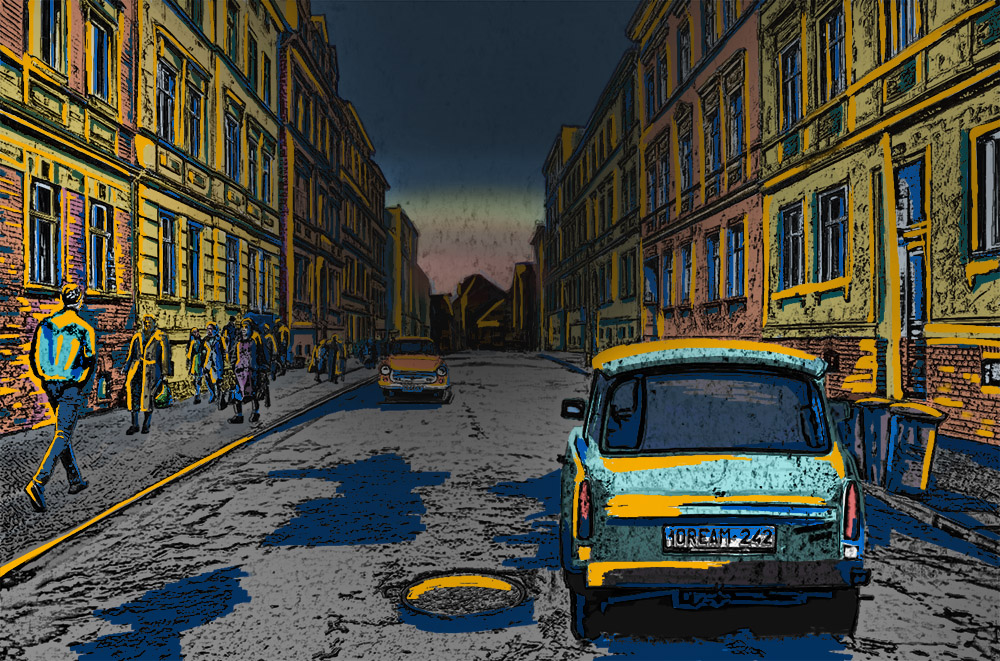
Gerd strode out of the multi-level Stasi building, its endless rows of windows keeping watch over the city, and swung toward the Frankfurter Allee U-Bahn. Schlagel had made the call in his presence. It would be good to have his job back. He had plans for his wages.
Should he buy a Strat like his old one? Or a Les Paul? Anything, really— didn’t matter. He would get an amp, cords, picks, whatever he needed. He would find a new bass player and a new drummer. And maybe a second guitarist.
He wished he could have talked with those men, for questions remained. Why only play music? Why not accomplish something earthshaking, stop Germany from dividing against itself? — Well, maybe events that big were set in stone. And what about that “Gorbachev?”
But as to why they played concrete instruments— that, he knew.
He walked the street with a mighty stride. He walked like the western visitors did, although he was not aware of this. Passersby swirled around him, some talking in conversations that rose and fell as they passed. A Trabant car, cardboard on wheels, puttered by. He did not really hear them, for his mind was focused on one thought:
What future did the Anti-Fascist Protective Rampart have, if it would one day be turned into electric guitars?


